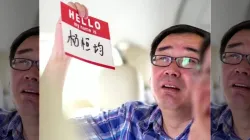Yang Hengjun: What is a suspended death sentence in China? EXPLAINED
The suspended death sentence in Chinese law gives the accused a two-year reprieve from being executed, after which it is automatically converted to life imprisonment, or more rarely, fixed-term imprisonment.

Beijing: Australian writer and pro-democracy blogger Yang Hengjun was handed a suspended death sentence by a Beijing court on Monday, in what human rights advocates say is an unusually harsh verdict in an espionage-related case. However, there is some confusion about the suspended death penalty. Here are the key details about the law.
What is the suspended death penalty?
The suspended death sentence in Chinese law gives the accused a two-year reprieve from being executed, after which it is automatically converted to life imprisonment, or more rarely, fixed-term imprisonment. The individual remains in prison throughout. "It has been used more commonly in recent years as a way to reduce the prevalence of executions without abolishing the death penalty altogether," said Ryan Mitchell, a law professor at the University of Hong Kong, adding that the exact prevalence of death sentences, including suspensions, is treated by China as a state secret.
"The sentence is used for a wide range of cases, and isn't associated with one particular type of crime," said Mitchell. He said that it is often used for offences regarded as having "serious negative social impact" such as drug trafficking.
In December, a former vice chairman of China's banking regulator was sentenced to death with a two-year reprieve for accepting bribes and abuse of power. The same sentence was also handed to former justice minister Fu Zhenghua in 2022 for taking bribes. Whether it is carried out or not, the sentence effectively amounts to the death penalty because of Yang's ailing health and the inadequate medical care he has received in prison, said Elaine Pearson, director of Human Rights Watch's Asia Division.
Possibility of deportation
According to Mitchell, parole is "usually not capable of being granted until after half of a fixed term has been completed, or after 10 years have been served in case of life imprisonment." But China's top court can make exceptions in "special circumstances", he added. "For a case of this nature, the availability of that discretion after the two-year period concludes would help to maintain a certain degree of diplomatic leverage," he said.
Patrick Poon, an independent human rights analyst and visiting scholar at the University of Tokyo, said it is "very rare to see espionage cases get a suspended death sentence" in China, especially since the Australian government has been vocal in demanding Yang's release.
"It becomes another issue of how much international and diplomatic pressure is put on the Chinese government," he said, referring to the cases of Australian national Cheng Lei and the Canadian "two Michaels", who were eventually deported back to their home countries after being tried on espionage allegations. "There is still a possibility that Yang may be deported, but it's unclear for the moment," Poon added.
Lack of transparency
China's foreign ministry on Monday confirmed Yang's sentence and that he had been found guilty of espionage, without giving further details of the charges. "The court heard the trial in strict accordance with the law and ensured his procedural rights," spokesperson Wang Wenbin said at a daily briefing, adding that the "Australian side" had been allowed to witness the sentencing. Yang's lawyers, who include prominent Chinese human rights lawyer Mo Shaoping, have been forbidden from speaking publicly about the case.
Chinese courts have a 99.9% conviction rate and verdicts for national security or death penalty-related cases are never published online. "This case really spotlights what happens to people who are arbitrarily detained on national security charges in China and it highlights the opaqueness of the criminal justice system," said Pearson.
(With inputs from Reuters)